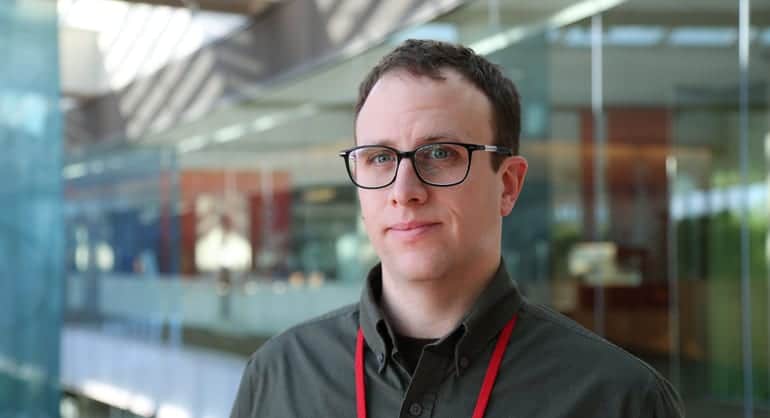It can be difficult to define the threshold for when data becomes “big data,” but it is clear that as research technologies become more sophisticated, scientists are collecting and analyzing information that necessitates advanced computing tools.
Andy Pohl hopes to be a resource for those wanting to take advantage of advanced computing.
As a Morgridge Postdoctoral Fellow, Pohl will facilitate a collaboration between the Morgridge Institute’s Core Computational Technologies (CCT) team, led by director Miron Livny, and UW–Madison’s Waisman Center, a facility led by interim director Albee Messing that specializes in the study of intellectual and developmental disabilities.
The Waisman Center encompasses a diverse group of researchers in more than 25 affiliated UW–Madison departments, from geneticists and stem cell researchers to behavioral and social scientists.
Pohl isn’t certain how many of the groups will take advantage of his role as a computing facilitator, but he says the researchers working with brain scans are already using the advanced computing resources frequently. Brain imaging is a good example of something that’s almost always considered big data.
“A brain scan is fairly high resolution and you don’t have just one, you have many—more than one patient, more than one sample, more than one time point,” Pohl says. “And then as scientists we do everything in triplicate. It’s all these multiplications that make data very big, very quickly.”
Throughout his academic career, Pohl transitioned from computer science to bioinformatics to biomedicine. When studying computer science as an undergraduate student at UW–Madison, Pohl initially thought he would become a programmer at a bank like one of his relatives.
It was a summer job working in the biostatistics department that exposed him to biological research and led him to a graduate program in bioinformatics at University of California, Santa Cruz, where he got a master’s degree.
“I thought if I wanted to land the jobs I wanted to get, I wasn’t competitive without a PhD,” says Pohl. “I wanted a change. I decided, from a more personal standpoint, to use that part of my life to not just get a degree, but to learn a foreign language and see a part of the world that I had never traveled to.”
Cue a biomedicine doctoral program in Barcelona, Spain. During this time, Pohl studied chromatin and gene regulation in a specific breast cancer cell line and developed open-source bioinformatics software.
Armed with a unique set of skills encompassing both computer science and biological fields, Pohl has returned to Madison to help scientists realize the full potential of their current computational strategies and showcase additional resources.
“It’s my personal observation that an engineer or a computer scientist will approach problems by breaking the problem into sub problems, prototyping, and tearing stuff apart to see how it works,” Pohl says. “The biologist simply asks a question. They have a hypothesis and run an experiment or multiple experiments. In biology there’s just so much more uncertainty. You don’t know all the pieces, and you can’t see all the pieces.”
Pohl says he thinks having an understanding of both computer science and biological approaches to research will enhance his capabilities as a research computing facilitator and potentially encourage further interdisciplinary collaborations.
“We’re building a relationship with Waisman at the moment that may start with me, but hopefully it doesn’t end with me,” Pohl says. “My goal is to identify bottlenecks, road blocks, and obstacles in research and keep as many possibilities open for people as I can.”
